Biomedical scientists at Blackburn hospital striking over pay and conditions
Nat Goodlad
Tue, 21 February 2023

Biomedical scientists at Royal Blackburn Hospital will strike on Wednesday this week
Around 70 biomedical scientists at the East Lancashire Hospitals NHS Trust will strike at Royal Blackburn Hospital from 7am to 7pm tomorrow (Wednesday, February 22).
The workers’ union, Unite, says more strikes will be scheduled if the government fails to address poor pay and unsafe staffing across the NHS.
With more ambulance worker strikes also set for the coming weeks, Unite has again hit out at the prime minister for failing to get into the room to address chronic low pay and unsustainable workloads.
These issues are driving a recruitment and retention crisis and devastating the NHS, Unite said.
Unite ambulance workers in the North West are to stage strike action again on Wednesday in the ongoing row over pay and conditions.
Unite general secretary Sharon Graham said: “The government’s refusal to do its job, to get around the table and negotiate a solution to these strikes, is frankly shocking.
"They are failing the country and failing the NHS.
“The strikes are spreading. More health workers are taking a stand for patients and for decent pay. Meanwhile, Rishi Sunak remains missing in action.
“Unite’s NHS members are fighting for the future of our health service. They are faced with a government that appears to be hell-bent on destroying it. They have their union’s full support.”
The biomedical scientists are part of East Lancashire Hospitals NHS Trust’s pathology department.
They analyse patients’ blood samples at Royal Blackburn Hospital and Burnley General Teaching Hospital.
Unite regional officer Keith Hutson said: “NHS workers are striking because they know without a proper pay rise, more staff will leave the health service.
This will turn the current crisis in patient care into a disaster.”
The Government has said the Health Secretary "has been clear he wants to continue discussing how we can make the make the NHS a better place to work for all".
East Lancashire Hospitals NHS Trust has been contacted for comment.
‘We are failing families’: Burnt out junior doctors on why they voted to strike
Maryam Zakir-Hussain
Tue, 21 February 2023
Junior doctors who have voted unanimously for a 72-hour walkout said they think about quitting “every day” as they claim severe understaffing puts them and their patients at risk.
Feeling “burnt out” and “traumatised,” the doctors claim they are “endlessly firefighting” resulting in patients suffering and staff dreading coming into work.
A lack of staff also leaves medics working in “unsafe environments” as they battle with exhaustion and the constant fear of making high-risk mistakes, they say.
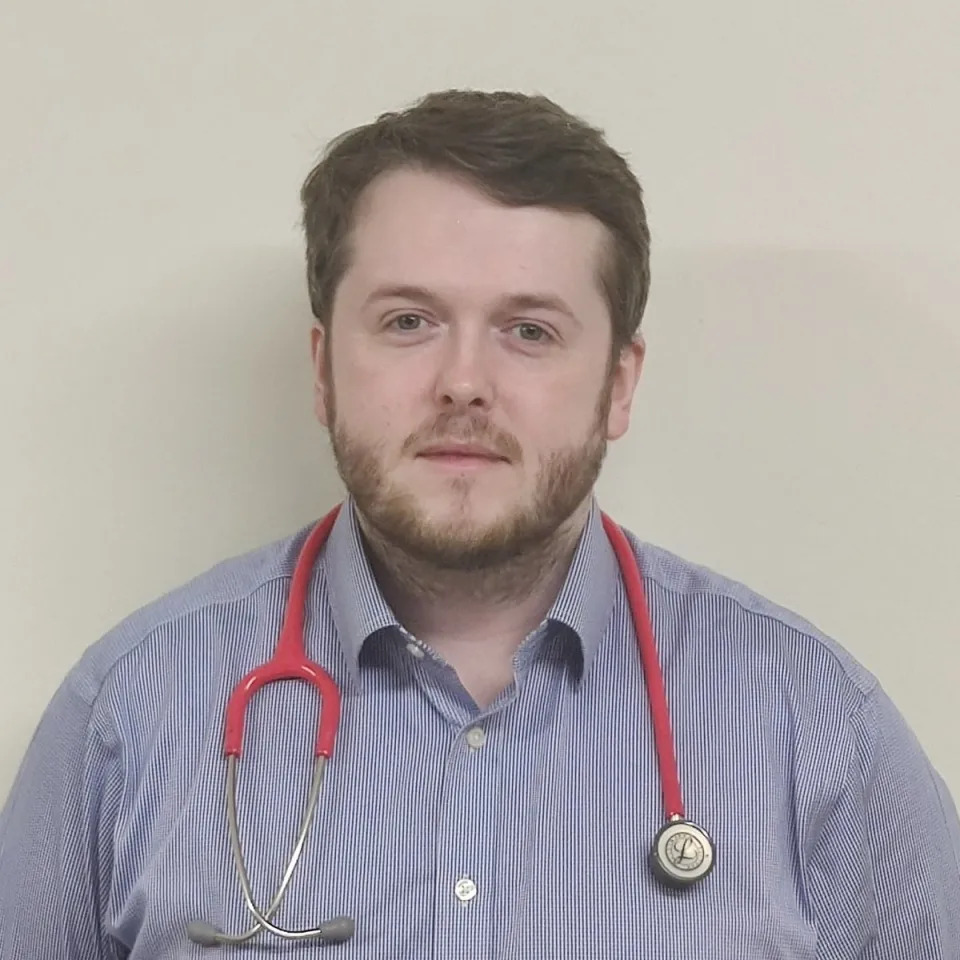
Dr Martin Whyte, deputy co-chair of the Junior Doctors Committee, said the system cannot cope (Supplied)
Dr Martin Whyte, a paediatric registrar and deputy co-chair of the Junior Doctors Committee, told The Independent that doctors feel like they are “failing families” due to a “fundamental issue of staffing and resourcing”.
“There is a real sense of moral injury,” Dr Whyte said. “We are not able to offer care at the standards we want to deliver because this system cannot cope with the volume of patients that are coming in.
“I’ve come onto shift with over 20 children waiting between six to seven hours to be seen,” he continued. “Within paediatrics, we’ve seen waiting time double. There is a real sense of failing these families. The children spend too much time in the hospital and we want to get them home as quickly as possible.
“But if the NHS can’t retain doctors and nurses, these problems aren’t going to go away.”
The issue of critically-low staffing issue was also highlighted by a junior doctor, who does wish to be named, claiming she often works 13-hour shift with no breaks in a London hospital.
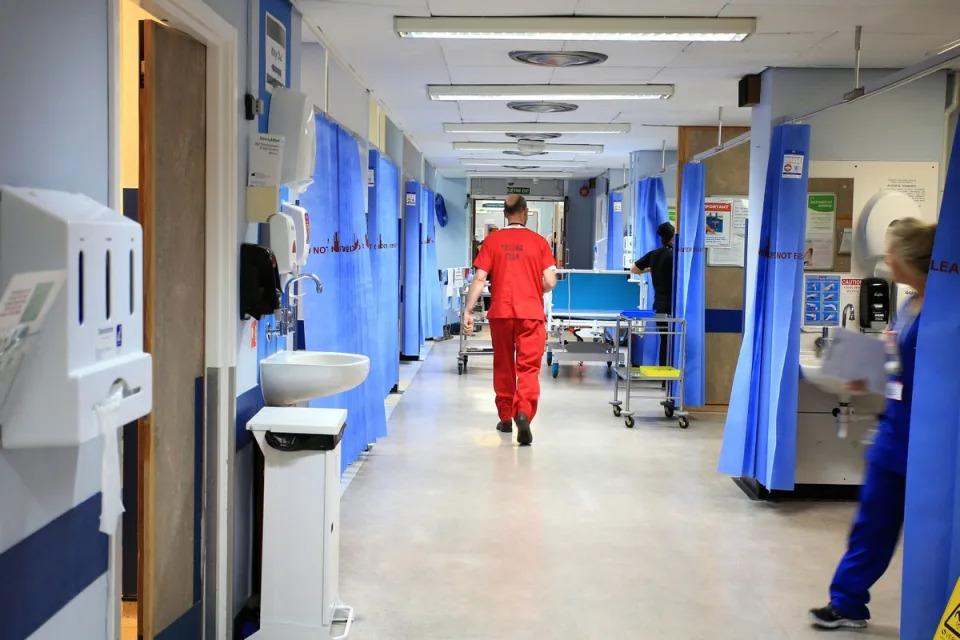
Junior doctors who have voted unanimously for a 72-hour walkout have said they think about quitting “every day” (PA)
“We don’t have the minimum staffing level which is deemed to be safe for patients. So we’re more scared of making mistakes,” she said.
“In ICU, you are meant to have one-to-one nursing for patients. But we actually have two patients per nurse which means we can’t give care to the optimum level.
“Patients can deteriorate because we are stretched and see them later than planned. It’s so upsetting as a doctor, but we are really trying.”
Almost 37,000 junior doctors belonging to the British Medical Association (BMA) – 98 per cent of those who voted – said yes to next month’s strike action.
The BMA claims that, after a real-terms pay cut of more than 26 per cent since 2008, junior doctors were offered an “insulting” 2 per cent pay rise in the current year.
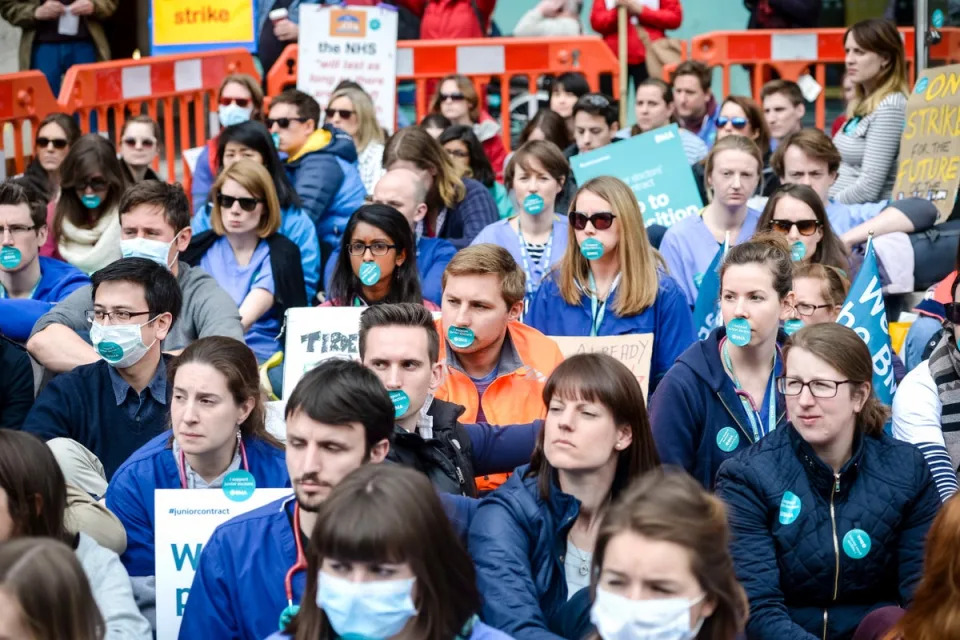
Junior doctors are to stage a walkout in a dispute over pay (PA)
“I get really upset because I love medicine, but I don’t like working as a doctor in the UK,” the junior doctor said.
“We’re portrayed as money-hungry, but we’re not even asking for a pay increase. We’re just asking for pay restoration. A lot of first-year doctors are struggling to pay their rent.”
Echoing the claim that salaries do not represent medicine’s “long-training programmes,” Dr Whyte said: “People are going to Australia and New Zealand because they can get paid two or three times the salary.”
A survey from BMA showed that in 2022, 6,950 doctors applied for a certificate to work abroad – an increase of 24 per cent on the previous year.
According to the recruitment website Glassdoor, as of February, junior doctors in Australia earn an average of £70,000 Australian dollars - around £40,000.
Another London-based junior doctor, who does not wish to be named, said “the thought of leaving crosses [her] mind every day”.
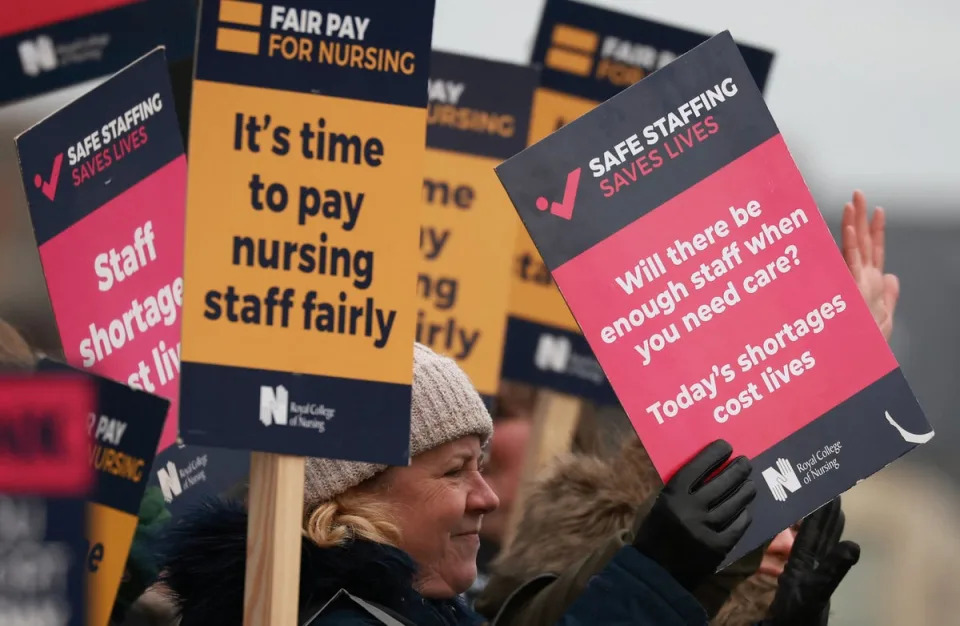
Nurse have already staged a number of walkouts (REUTERS)
She claimed that on the weekends, junior doctors are expected to “manage a whole hospital which normally is run by teams from every department”.
Despite this, she said: “Junior doctors are not treated with respect, are not well-supported and not well-paid. We’re like a little traumatised family.
“If the government doesn’t put more money into paying staff on the front line, then no one is going to stay. Doctors and nurses aren’t machines, we have to put our finances first.
“As much as we love taking care of people, it’s not enough to make you happy.”
Health secretary Steve Barclay said: “We hugely value the work of junior doctors, and it is deeply disappointing some union members have voted for strike action.
“As part of a multi-year deal we agreed with the BMA, junior doctors’ pay has increased by a cumulative 8.2 per cent since 2019/20. We also introduced a higher pay band for the most experienced staff and increased rates for night shifts.”
The Department of Health has been contacted for comment.
Maryam Zakir-Hussain
Tue, 21 February 2023
Junior doctors who have voted unanimously for a 72-hour walkout said they think about quitting “every day” as they claim severe understaffing puts them and their patients at risk.
Feeling “burnt out” and “traumatised,” the doctors claim they are “endlessly firefighting” resulting in patients suffering and staff dreading coming into work.
A lack of staff also leaves medics working in “unsafe environments” as they battle with exhaustion and the constant fear of making high-risk mistakes, they say.

Dr Martin Whyte, deputy co-chair of the Junior Doctors Committee, said the system cannot cope (Supplied)
Dr Martin Whyte, a paediatric registrar and deputy co-chair of the Junior Doctors Committee, told The Independent that doctors feel like they are “failing families” due to a “fundamental issue of staffing and resourcing”.
“There is a real sense of moral injury,” Dr Whyte said. “We are not able to offer care at the standards we want to deliver because this system cannot cope with the volume of patients that are coming in.
“I’ve come onto shift with over 20 children waiting between six to seven hours to be seen,” he continued. “Within paediatrics, we’ve seen waiting time double. There is a real sense of failing these families. The children spend too much time in the hospital and we want to get them home as quickly as possible.
“But if the NHS can’t retain doctors and nurses, these problems aren’t going to go away.”
The issue of critically-low staffing issue was also highlighted by a junior doctor, who does wish to be named, claiming she often works 13-hour shift with no breaks in a London hospital.

Junior doctors who have voted unanimously for a 72-hour walkout have said they think about quitting “every day” (PA)
“We don’t have the minimum staffing level which is deemed to be safe for patients. So we’re more scared of making mistakes,” she said.
“In ICU, you are meant to have one-to-one nursing for patients. But we actually have two patients per nurse which means we can’t give care to the optimum level.
“Patients can deteriorate because we are stretched and see them later than planned. It’s so upsetting as a doctor, but we are really trying.”
Almost 37,000 junior doctors belonging to the British Medical Association (BMA) – 98 per cent of those who voted – said yes to next month’s strike action.
The BMA claims that, after a real-terms pay cut of more than 26 per cent since 2008, junior doctors were offered an “insulting” 2 per cent pay rise in the current year.

Junior doctors are to stage a walkout in a dispute over pay (PA)
“I get really upset because I love medicine, but I don’t like working as a doctor in the UK,” the junior doctor said.
“We’re portrayed as money-hungry, but we’re not even asking for a pay increase. We’re just asking for pay restoration. A lot of first-year doctors are struggling to pay their rent.”
Echoing the claim that salaries do not represent medicine’s “long-training programmes,” Dr Whyte said: “People are going to Australia and New Zealand because they can get paid two or three times the salary.”
A survey from BMA showed that in 2022, 6,950 doctors applied for a certificate to work abroad – an increase of 24 per cent on the previous year.
According to the recruitment website Glassdoor, as of February, junior doctors in Australia earn an average of £70,000 Australian dollars - around £40,000.
Another London-based junior doctor, who does not wish to be named, said “the thought of leaving crosses [her] mind every day”.

Nurse have already staged a number of walkouts (REUTERS)
She claimed that on the weekends, junior doctors are expected to “manage a whole hospital which normally is run by teams from every department”.
Despite this, she said: “Junior doctors are not treated with respect, are not well-supported and not well-paid. We’re like a little traumatised family.
“If the government doesn’t put more money into paying staff on the front line, then no one is going to stay. Doctors and nurses aren’t machines, we have to put our finances first.
“As much as we love taking care of people, it’s not enough to make you happy.”
Health secretary Steve Barclay said: “We hugely value the work of junior doctors, and it is deeply disappointing some union members have voted for strike action.
“As part of a multi-year deal we agreed with the BMA, junior doctors’ pay has increased by a cumulative 8.2 per cent since 2019/20. We also introduced a higher pay band for the most experienced staff and increased rates for night shifts.”
The Department of Health has been contacted for comment.
‘Junior doctors are going to Australia in droves because they come out with £100,000 debt here’
Rosa Silverman
Tue, 21 February 2023

Dr Jim Down on the NHS: 'I’m sure there are reforms to make, but really it comes down to investing' - Heathcliff O'Malley
Lying in bed at night, Dr Jim Down sometimes imagines being in the intensive care unit (ICU) where he works, “wired up to the bleeping machinery … with tubes into my stomach, airway, arteries and veins.” Not immensely comforting thoughts for a self-confessed hypochondriac.
Indeed, working as an intensive care doctor may seem an unlikely career choice for someone who suffers from health anxiety. Not unexpectedly, practising medicine hasn’t helped Dr Down’s. As a medical student, he worried he had every disease going. “Apart from in obs and gynae!” he says.
Undeterred, he opted for a role as a critical care consultant in the ICU at London’s University College Hospital, where he has worked since 2005. Here, among the breathing tubes and digital displays of the ventilators, life and death decisions are routinely made. It’s an area of medicine that mercifully few of us have glimpsed – but one he has helped to demystify in his compelling new memoir, Life In The Balance.
The aim of his second book (his first, Life Support, chronicled his time working through the Covid crisis) is to show what happens in an ICU, but also to prompt conversation about difficult ethical questions around the value of human life: “What’s the right thing to do, how much suffering is worth it, [what is] quality of life?” he says, listing what’s at stake. “There are some big dramatic days [in ICU] but more of the time is spent wrestling with what to do.”
Working in a major teaching hospital in central London, Dr Down has lived through more of recent history than most. He was a new consultant when the July 7 terror attacks brought carnage to the capital. His gut-wrenching descriptions of injuries are graphic. “Her lower limbs had taken the full force of the blast and were a mangled mess of tendons, muscle and skin,” he writes of a 33-year-old casualty. “As we tilted her to the trolley it became apparent that someone else’s foot was embedded in her thigh…”

Dr Down dealt with victims of the 7/7 terror attacks while working at a teaching hospital in central London - Getty
The following year, former Russian spy Alexander Litvinenko was admitted to Bed 9 in the hospital’s ICU, having been poisoned with radioactive polonium-210. “Eventually, we accepted the inevitable and terminated CPR,” he writes. “I had been a consultant for a little over a year and this man was the lead item on the national news. He had died on my watch and I didn’t know why.”
Would he and his colleagues also suffer the adverse effects of polonium? How a self-confessed hypochondriac coped is hard to fathom, and yet he did, and ploughed on.
Growing up in Dorset, his father was a doctor, but young Jim was convinced medicine wasn’t for him until aged 17, when a week of work shadowing made him think, “Actually, I really quite like it.”
This, despite his habit of fainting when things got messy.
Now 52, he juggles the ICU with family life: he met his wife of 16 years, actress Patricia Potter, 47, in 2003 on the set of BBC drama Holby City, when he was a medical adviser, and the couple have 13-year-old twins. With age has come experience but, counterintuitively, not a tougher skin. “[As] a junior doctor, you’re 25, you think you’re immortal. As I’ve got older, I relate to the patients more. In many ways I’m more affected now, I’m more doubtful.”
Decisions, such as when to continue trying to save a patient, and when to accept defeat, can seem less clear. Does confronting the precariousness of human life every week affect his philosophical outlook? “When I see people [in ICU], I always think ‘God, [I’m] so lucky, love every minute of your life,’” he says. “And then within five minutes of coming home I’m shouting at the children.”
On the page, he comes across as a sensitive man prone to doubts, trying to find the best solution to dilemmas few of us face in our daily lives: how to decide, for instance, who should get an ICU bed when there aren’t enough. He calls it the “impossible daily bed puzzle”, describing one fraught shift: “Now, we had 10 patients trying to get into seven beds…Should we downgrade? Cancel? Wing it and kick the problem down the road?”

Down treated former Russian spy Alexander Litvinenko just a year after qualifying - Getty
The options were bleak: cancel surgery for a morbidly obese bariatric patient? For a woman with throat cancer who had only a 30 per cent chance of surviving her disease for another year? “Proceeding with her surgery might mean delaying several other cases… She might well die in the next year for unrelated reasons,” he says. Tough choices have
to be made.
Dr Down recognises how extraordinary it seems that such important decisions about people’s lives are made “in such a last-minute and ad-hoc fashion”. But they are, every day.
Of course, ICU is not the only part of the NHS under pressure. Post-pandemic and post-austerity, our healthcare system is creaking under the strain. On the day I meet Dr Down in his tranquil north London townhouse, nurses and ambulance drivers are on strike. Junior doctors are being balloted on industrial action. They have Dr Down’s sympathy. “Particularly in London, as a nurse or junior doctor you can barely survive, so I’m with them,” he says. “There’s inflation and [other] problems, but I think we’ve got to look after them. Junior doctors are going to Australia in droves because they come out with £100,000 debt here.”
He does not envy young medics. In his day – he qualified in 1994 – “You could live reasonably comfortably and you knew it would be OK in the end.”
The system is overstretched. “[W]e run at over 90 per cent capacity,” he writes. Patients might question “whether we are working as safely, compassionately and efficiently as possible”.
The UK rate of ICU beds per head of population is one of the lowest in Europe. Post-Brexit, staffing those beds has become “increasingly challenging”. And so they have to be juggled; operations postponed.
Dr Down doesn’t claim to have the answer to how we fix our healthcare system, but has concerns: “The investment in the NHS in the last 10 years has slowed down and you really feel that.” In the New Labour years, he points out, waiting lists were not an issue. “I’m sure there are reforms to make, but really it comes down to investing.”
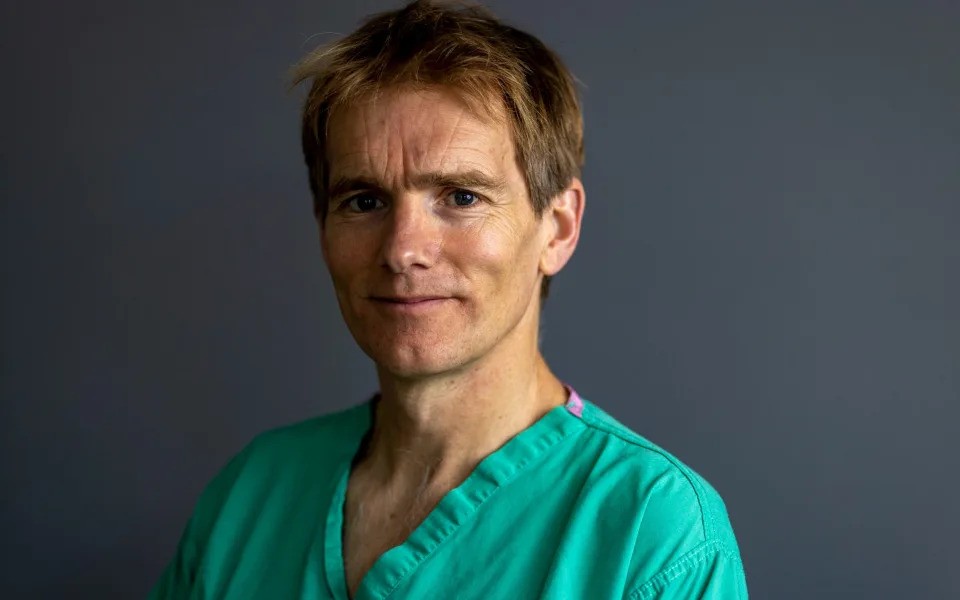
Dr Down says that his mental health has been affected by working in ICU - Heathcliff O'Malley
But in an ageing society, where medical advances mean patients can be kept alive far longer, spending more on clinical care for the sick can only be part of the solution. A greater focus on prevention, he believes, is crucial. Smoking has dwindled since the 2007 smoking ban. Now, it is time to tackle the next great public health problem, he argues.
“You’ve got to take on ultra-processed foods and sugar. That’s number one.”
He has adopted a healthier lifestyle with age, taking exercise including cold-water swimming (“such a cliché”). He hardly drinks alcohol – “partly because I can’t, I just feel awful” – and eats better. After losing his mother to dementia last year he tries to keep his brain healthy, by doing Wordle. “Do you think that helps?”
Disconcertingly, it is possible to make all the right lifestyle choices and still succumb to disease. But what about patients who end up in ICU as a result of making the wrong choices? He insists there is never room to be judgmental. “It’s not our job [to judge],” he says.
Inevitably, working in ICU, not all his patients survive. Some deaths hit him especially hard. In the book he describes how the death of a patient called Linda, a 56-year-old alcoholic with a ruptured oesophagus, triggered a mental health breakdown that meant Dr Down had to temporarily stop working. Today, he’s in a better place, mentally, after seeking support.
Seizing the day is easier said than done, he smiles ruefully. “But it’s made me get up in the morning and get on. I suppose I’m aware of how long there is left.”
‘Life in the Balance: A Doctor’s Stories of Intensive Care’ by Jim Down
Rosa Silverman
Tue, 21 February 2023

Dr Jim Down on the NHS: 'I’m sure there are reforms to make, but really it comes down to investing' - Heathcliff O'Malley
Lying in bed at night, Dr Jim Down sometimes imagines being in the intensive care unit (ICU) where he works, “wired up to the bleeping machinery … with tubes into my stomach, airway, arteries and veins.” Not immensely comforting thoughts for a self-confessed hypochondriac.
Indeed, working as an intensive care doctor may seem an unlikely career choice for someone who suffers from health anxiety. Not unexpectedly, practising medicine hasn’t helped Dr Down’s. As a medical student, he worried he had every disease going. “Apart from in obs and gynae!” he says.
Undeterred, he opted for a role as a critical care consultant in the ICU at London’s University College Hospital, where he has worked since 2005. Here, among the breathing tubes and digital displays of the ventilators, life and death decisions are routinely made. It’s an area of medicine that mercifully few of us have glimpsed – but one he has helped to demystify in his compelling new memoir, Life In The Balance.
The aim of his second book (his first, Life Support, chronicled his time working through the Covid crisis) is to show what happens in an ICU, but also to prompt conversation about difficult ethical questions around the value of human life: “What’s the right thing to do, how much suffering is worth it, [what is] quality of life?” he says, listing what’s at stake. “There are some big dramatic days [in ICU] but more of the time is spent wrestling with what to do.”
Working in a major teaching hospital in central London, Dr Down has lived through more of recent history than most. He was a new consultant when the July 7 terror attacks brought carnage to the capital. His gut-wrenching descriptions of injuries are graphic. “Her lower limbs had taken the full force of the blast and were a mangled mess of tendons, muscle and skin,” he writes of a 33-year-old casualty. “As we tilted her to the trolley it became apparent that someone else’s foot was embedded in her thigh…”

Dr Down dealt with victims of the 7/7 terror attacks while working at a teaching hospital in central London - Getty
The following year, former Russian spy Alexander Litvinenko was admitted to Bed 9 in the hospital’s ICU, having been poisoned with radioactive polonium-210. “Eventually, we accepted the inevitable and terminated CPR,” he writes. “I had been a consultant for a little over a year and this man was the lead item on the national news. He had died on my watch and I didn’t know why.”
Would he and his colleagues also suffer the adverse effects of polonium? How a self-confessed hypochondriac coped is hard to fathom, and yet he did, and ploughed on.
Growing up in Dorset, his father was a doctor, but young Jim was convinced medicine wasn’t for him until aged 17, when a week of work shadowing made him think, “Actually, I really quite like it.”
This, despite his habit of fainting when things got messy.
Now 52, he juggles the ICU with family life: he met his wife of 16 years, actress Patricia Potter, 47, in 2003 on the set of BBC drama Holby City, when he was a medical adviser, and the couple have 13-year-old twins. With age has come experience but, counterintuitively, not a tougher skin. “[As] a junior doctor, you’re 25, you think you’re immortal. As I’ve got older, I relate to the patients more. In many ways I’m more affected now, I’m more doubtful.”
Decisions, such as when to continue trying to save a patient, and when to accept defeat, can seem less clear. Does confronting the precariousness of human life every week affect his philosophical outlook? “When I see people [in ICU], I always think ‘God, [I’m] so lucky, love every minute of your life,’” he says. “And then within five minutes of coming home I’m shouting at the children.”
On the page, he comes across as a sensitive man prone to doubts, trying to find the best solution to dilemmas few of us face in our daily lives: how to decide, for instance, who should get an ICU bed when there aren’t enough. He calls it the “impossible daily bed puzzle”, describing one fraught shift: “Now, we had 10 patients trying to get into seven beds…Should we downgrade? Cancel? Wing it and kick the problem down the road?”

Down treated former Russian spy Alexander Litvinenko just a year after qualifying - Getty
The options were bleak: cancel surgery for a morbidly obese bariatric patient? For a woman with throat cancer who had only a 30 per cent chance of surviving her disease for another year? “Proceeding with her surgery might mean delaying several other cases… She might well die in the next year for unrelated reasons,” he says. Tough choices have
to be made.
Dr Down recognises how extraordinary it seems that such important decisions about people’s lives are made “in such a last-minute and ad-hoc fashion”. But they are, every day.
Of course, ICU is not the only part of the NHS under pressure. Post-pandemic and post-austerity, our healthcare system is creaking under the strain. On the day I meet Dr Down in his tranquil north London townhouse, nurses and ambulance drivers are on strike. Junior doctors are being balloted on industrial action. They have Dr Down’s sympathy. “Particularly in London, as a nurse or junior doctor you can barely survive, so I’m with them,” he says. “There’s inflation and [other] problems, but I think we’ve got to look after them. Junior doctors are going to Australia in droves because they come out with £100,000 debt here.”
He does not envy young medics. In his day – he qualified in 1994 – “You could live reasonably comfortably and you knew it would be OK in the end.”
The system is overstretched. “[W]e run at over 90 per cent capacity,” he writes. Patients might question “whether we are working as safely, compassionately and efficiently as possible”.
The UK rate of ICU beds per head of population is one of the lowest in Europe. Post-Brexit, staffing those beds has become “increasingly challenging”. And so they have to be juggled; operations postponed.
Dr Down doesn’t claim to have the answer to how we fix our healthcare system, but has concerns: “The investment in the NHS in the last 10 years has slowed down and you really feel that.” In the New Labour years, he points out, waiting lists were not an issue. “I’m sure there are reforms to make, but really it comes down to investing.”

Dr Down says that his mental health has been affected by working in ICU - Heathcliff O'Malley
But in an ageing society, where medical advances mean patients can be kept alive far longer, spending more on clinical care for the sick can only be part of the solution. A greater focus on prevention, he believes, is crucial. Smoking has dwindled since the 2007 smoking ban. Now, it is time to tackle the next great public health problem, he argues.
“You’ve got to take on ultra-processed foods and sugar. That’s number one.”
He has adopted a healthier lifestyle with age, taking exercise including cold-water swimming (“such a cliché”). He hardly drinks alcohol – “partly because I can’t, I just feel awful” – and eats better. After losing his mother to dementia last year he tries to keep his brain healthy, by doing Wordle. “Do you think that helps?”
Disconcertingly, it is possible to make all the right lifestyle choices and still succumb to disease. But what about patients who end up in ICU as a result of making the wrong choices? He insists there is never room to be judgmental. “It’s not our job [to judge],” he says.
Inevitably, working in ICU, not all his patients survive. Some deaths hit him especially hard. In the book he describes how the death of a patient called Linda, a 56-year-old alcoholic with a ruptured oesophagus, triggered a mental health breakdown that meant Dr Down had to temporarily stop working. Today, he’s in a better place, mentally, after seeking support.
Seizing the day is easier said than done, he smiles ruefully. “But it’s made me get up in the morning and get on. I suppose I’m aware of how long there is left.”
‘Life in the Balance: A Doctor’s Stories of Intensive Care’ by Jim Down
No comments:
Post a Comment